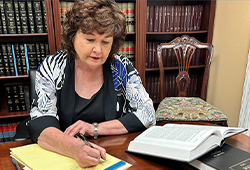Do you need a will? (Spoiler alert: Yes!)

Guest blog post by Connie Glass, Certified Elder Law Attorney, Elder Law Firm of Connie Glass
I have been practicing law for over 40 years, specifically in the field of elder law for 36 of those years. In all those years, I have heard every reason imaginable as to why someone does not need a will. Some of the more common reasons (or excuses?) are "My family knows what I want", or "I don't have enough to bother with a will", or "I don't know what to put in a will", and on and on. The simple fact is every person who is over the age of 18 in Alabama needs to have a will. When a person dies, there may not be anything that the person owns that will be controlled by the will, but if there is not a will and there are assets in the deceased person's name only, it's certainly too late to do a will then! The state of Alabama has decided for you what will happen to your assets if you have not written a will.
Basically, in order to prepare a will in Alabama, you must know what you own, who your next-of-kin are, who you want to inherit and who you want to be in charge of the will. Many people only think of leaving assets to children or other family members. However, a will is a perfect opportunity to continue philanthropy by leaving assets to charities or organizations that are meaningful to you. When you write a will, you are not limited to just family. You can think "outside the box" to leave a legacy.
A will is going to control the disposition of any asset that a person owns in their name only that does not have a joint owner or a designated beneficiary. A will directs distribution of these assets at death and names someone to handle the affairs of the estate. A will can create trusts for minor or disabled beneficiaries and can name a guardian for these persons. A will can also provide directions on what to do with family pets.
The technical requirements for a valid Will in Alabama are as follows:
- Will must be in writing
- The person making the will must be at least 18 years of age, of sound mind, and not being under any coercion or duress
- The person making the will must sign the will or someone may sign for the person at the person's direction and in their presence
- Must have two witnesses of sound mind and over the age of 19
- Self-proving will must be notarized and include statutory language to make the Will "self-proving". Non-self proving wills are still valid upon proper proof of will.
There are other provisions that can be in a will that make the process much easier for the family. Some of these are as follows:
- Appointment of guardian for minor child, disabled spouse or adult disabled child
- Planning to eliminate or minimize estate taxes, if there is a taxable estate
- Trusts for asset management for minor or disabled heirs or spouse
- Exemption from filing of bond, inventory, and accounting by Personal Representative
- Power to sell real property and other assets without court order
- Other specific powers to deal with the assets of the estate
A will should be reviewed periodically by an attorney to make sure that it is consistent with that person's current estate plan and to make sure that it complies with any changes that may have taken place in the law. Also, any time there is a major life event, such as the birth or death of a child or spouse or significant financial gains or setbacks, the will should be reviewed, along with all other estate planning documents.
August is National Make-a-Will Month, so there is no better time to start the process of making YOUR will! For a free estate planning guide, please contact Lynne Berry Vallely at [email protected]or (256) 265-9271. For more information about estate planning, go to hhfplannedgiving.org .



